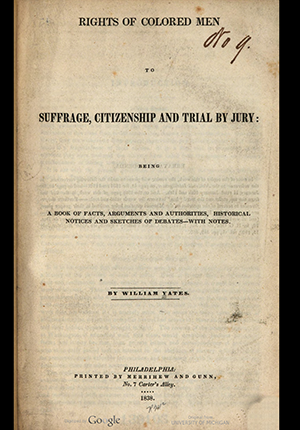Historic Document
The Rights of Colored Men (1838)
William Yates | 1838

University of Michigan
Summary
In 1838, abolitionist William Yates published the first legal treatise on the rights of free black Americans. Yates insisted that all free Americans were citizens who were entitled to the “privileges and immunities” guaranteed to citizens in Article IV, Section 2, Clause 1 of the Constitution. Yates’s call for the equal rights of citizenship relating to “persons and to things; his acquisitions of property by contract, and by inheritance; and even the soil which no alien inherits” became law in the 1866 Civil Rights Act and became one of the fundamental principles underlying Section One of the Fourteenth Amendment.
Selected by

Laura F. Edwards
Class of 1921 Bicentennial Professor in the History of American Law and Liberty, and Professor of History at Princeton University

Kurt Lash
E. Claiborne Robins Distinguished Professor of Law at the University of Richmond
Document Summary
Citizenship of persons of color.
In regard to citizenship, this is a subject of great importance—an exclusion from suffrage is a withholding of political rights only, but the question of citizenship strikes deeper; deny a man this, and his personal rights are not safe. He may be hindered from going into a State—or, if he enters it, he may be expelled, or treated as an alien. On this principle Missouri attempted to prohibit free colored men from coming into, or settling in the State, on any pretext whatever. . . .
“The citizens of each State shall be entitled to all the privileges and immunities of citizens in the several States.” Const. U. S. Art. iv. Sec. 2, clause 1.
These are important and valuable privileges. “Do they belong to free persons of color? If they were white it is conceded they would. The point then turns on a distinction of color. But such a distinction, as the basis of fundamental rights, is not recognized by the common law of England, or the principles of the British constitution; nor by our own declaration of independence.
Free persons of color are human beings, natives of the country—for such of we speak—and owe the same obligations to the State, and to its government as white citizens. They have an equal right to liberty—to the enjoyment and security of home and family—and of a good name and character as white men; so, to all the rights of conscience—to read, write, and print—to speak, teach, and debate—to preach, and worship God according to its dictates—their title as the same as that of white men. They have the same right to the rewards of their industry, as white men.—They may buy, hold, or sell real or personal estate, the same—and they are as fully entitled to the protection of the law—have a right to sue—to jury trial—to a verdict and judgment—to execution—to habeas corpus, and in some of the States to the writ of homine replegiando, or writ of personal replevin, as white men.—For them all our courts, from the highest to the lowest, are as open, and the officers as much bound to issue, to obey, and execute process, as for white men; and they equally, as white citizens, enjoy the advantages of the public mail.
Thus we see the colored man is not of an intermediate class—his relations to society are the same as others; his absolute and relative rights; his rights of persons and to things; his acquisitions of property by contract, and by inheritance; and even the soil which no alien inherits, are the same. Every favor or right conferred on the citizens by general legislation, reaches him, and every requisition demands his obedience.




